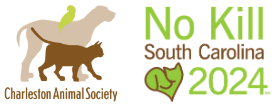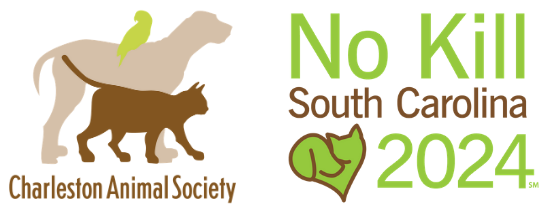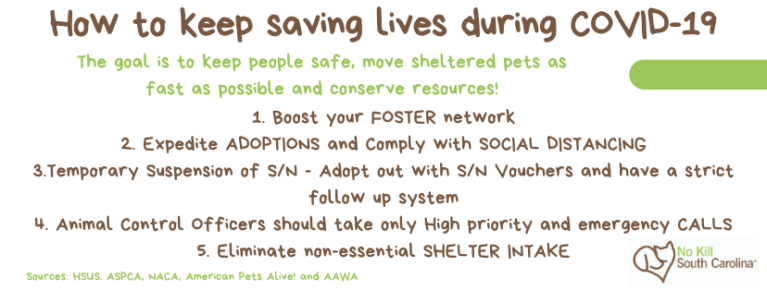The goal is to keep people safe, move sheltered pets as fast as possible and conserve resources!
Boost Foster Network – With the World Health Organization officially declaring the new coronavirus a pandemic, there remains little doubt animal shelters and rescues will be impacted by COVID-19. Is mass surrender of pets likely? No. But shelters will experience some impact due to hospitalization of community members, volunteers, and possibly even staff. https://www.animalsheltering.org/blog/expand-your-foster-network-combat-covid-19?fbclid=IwAR0FzjmUOkhVThUWeuK7eLcvb-SfwDOGhkCKgZrppWWs7pUj7yMpSf6ARcE
A protocol was created for use during an outbreak of coronavirus, but it can be used to help shelters continue to save lives during any type of emergency that impacts normal operations. Placing pets into foster homes during an emergency frees up space in a shelter’s kennels, enabling them to continue saving lives even if adoptions are unable to continue. https://docs.google.com/document/d/17kw50JdyRYFjLKYWefFRCiU_9OQetdyJTBsqe1LOQlQ/view
Expedite Adoptions and Comply with Social Distancing – To prevent the spread of the COVID-19, many shelters are implementing appointment-only adoptions and other measures to comply with social distancing protocols. https://www.aspcapro.org/resource/examples-field-adoption
Pandemic Creates Operational and Legal Challenges for Shelter, Veterinary Services. However, significant operational challenges stemming from the pandemic threaten the capacity of many shelters to provide animal care and veterinary medical services. Staff and volunteer shortages due to illness or quarantine and the need to engage in “social distancing” make providing the full range of critical sheltering services nearly impossible in many locations for the immediate future. Against this backdrop, there are recent requirements and recommendations, including some from the U.S. Surgeon General, to suspend elective or non-essential surgical procedures, which may be interpreted as applying to routine, non-emergency spay/neuter surgeries. https://www.aspcapro.org/resource/aspca-statement-concerning-spay-and-neuter-shelter-animals-during-covid-19-crisis Adoption from Foster – In order to prepare for the potential impact that COVID-19 could have on shelters due to an increase of intake or a decrease in rescue pulls, foster parents must be empowered to complete adoptions without requiring a staff member to be present. This will minimize human contact and expedite live outcomes. https://docs.google.com/document/d/1dfeu4lTzL6SSZLE_7NXtx1_z5rypUkuzHSpflhRU6as/view Adoptions Protocol – In order to prepare for the potential impact that COVID-19 could have on shelters due to an increase of intake or a decrease in rescue pulls, implementing open adoption policies is crucial to maximizing lifesaving. The cornerstone of open adoptions is embracing a non-judgemental approach to every adoption. Counselors will start from a place of “Yes” unless the adopter presents a reason that otherwise cannot be overcome. All adoption decisions will be made on the assumption that a visitor is a good person who came to an animal shelter today to do the right thing: adopt a shelter pet or support the organization. https://docs.google.com/document/d/1JY8wbJR7qqKwqoW4XJ5Joc47OPNfLXeNeaDAxtQOnL8/view
Temporary Suspension of Spay and Neuter – We know that many organizations are struggling with the urgent recommendation to suspend spay/neuter surgeries at this time. Katherine Shenar of AAWA and Kim Alboum of HSUS recently checked in with shelter medicine leaders Dr. Julie Levy and Dr. Sandra Newbury, who explained why spay/neuter is considered elective, and outlined the multiple reasons why these surgeries should be suspended during COVID-19. Key takeaways: “It’s about protecting human life,” says Dr. Newbury. And from Dr. Levy: “We have to preserve our resilience to recover from this.” https://www.youtube.com/watch?time_continue=4&v=ibL0DMMGz7U&feature=emb_logo
The National Animal Care and Control Association (NACA) states that “the lack of immediately available spay and neuter services should not be a reason for shelter euthanasia.” https://drive.google.com/file/d/1Fe19dsGzVnTRA6oL3fa1w1JFdpfzSaZn/view
Animal Control Officers should take only high priority and emergency calls – NACA recommends at this time, officers should continue to respond to emergency and high priority calls. High priority/emergency calls include law enforcement assistance, injured or sick stray animals, cruelty and neglect complaints, bite complaints, and dangerous and aggressive dog complaints https://www.nacanet.org/wp-content/uploads/2020/03/NACA-Statement-on-Animal-Control-Functions-1.pdf
Eliminate Non-Essential Shelter Intake – Animal control agencies should take active measures to reduce non-essential shelter intake. Measures taken should include returning pets in the field instead of impounding them, suspending non-emergency owner surrender intake, and encouraging owners who are ill to keep their pets at home whenever possible https://www.nacanet.org/wp-content/uploads/2020/03/NACA-Statement-on-Animal-Control-Functions-1.pdf
Sources: National Animal Care and Control Association, The Association for Animal Welfare Advancement, Humane Society of the United States, American Society for the Prevention of Cruelty to Animals and American Pets Alive!



